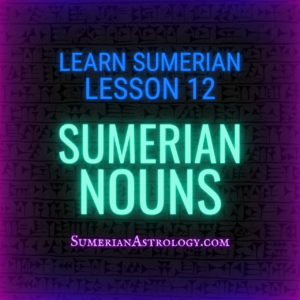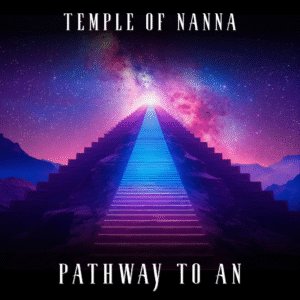Lesson 12
Sumerian Nouns
In this lesson, you’ll learn about simple, compound, and plural Sumerian nouns.
Need a Refresher on Reading Cuneiform?
Vocabulary to Memorize
I highly recommend memorizing these Sumerian words, as you’ll encounter them often in the upcoming lessons!
- a-a 𒀀𒀀 n., father.
- ama 𒂼 n., mother.
- anše 𒀲 n., donkey, equid, pack animal.
- dub-sar 𒁾𒊬 n., scribe.
- é-gal 𒂍𒃲 n., palace.
Vocabulary--Full List
Here are the vocabulary terms for this lesson. Be sure to look them over as they’re updated with additional meanings each lesson. You can see the full Sumerian Lexicon here.
- a-a 𒀀𒀀 n., father.
- ama 𒂼 n., mother.
- anše 𒀲 n., donkey, equid, pack animal.
- diĝir 𒀭 n., god, deity. det., indicates the name of a deity (abbr. d).
- dub-sar 𒁾𒊬 n., scribe.
- dumu 𒌉 n., child, son, daughter.
- é-gal 𒂍𒃲 n., palace.
- [e-]ne [𒂊]𒉈 pron., he/she, him/her, that one (pers.); to whom (OB); to you (pl.) (OB). part., plural marker (pers.).
- ga-ab-šúm 𒂵𒀊𒋧 n., seller.
- gal 𒃲 v., to be big, great; former. adj., big, great; former.
- ḫi 𒄭 v., to mix (up); process.
- ki-šár 𒆠𒊹 n., totality; whole earth; horizon; everywhere.
- lú 𒇽 n., man, male; human, person.
- lugal 𒈗 n., king; owner, master, lord.
- dnin-ḫur-saĝ 𒀭𒎏𒄯𒊕 n., oldest Sumerian mother goddess, embodied in the mountains; synonymous with ki 𒆠, the mother earth.
- šeš 𒋀 n., brother; colleague; assistant.
- zà(g)-mu 𒍠𒈬 n., new year.

Sumerian Nouns
Singular Nouns
Some Sumerian nouns are simple, one-sign words, as in:
ama 𒂼 mother
Some nouns are compounds created by combining nouns, adjectives, and even verbs, as in:
- ki-šár 𒆠𒊹 whole earth, horizon (land + totality)*
- é-gal 𒂍 𒃲 palace (house + great)
- dub-sar 𒁾𒊬 scribe (tablet + to write)
NOTE: *We’re told the Sumerians and their successors believed the Earth was flat, but I disagree with this for a number of reasons; the use of a solid sphere in the words for ‘earth’ and ‘horizon’, among them.
Some nouns may have initially been compounds, which eventually morphed into a single cuneiform sign, as in:
- lú + gal = lugal
- 𒇽 + 𒃲 = 𒈗
- man + great = king (lit. great man)
Some nouns are created through reduplication, as in:
a-a 𒀀𒀀: father (seed + seed)
Some nouns, including proper nouns, are actually short phrases which must be memorized, such as:
- ga-ab-šúm 𒂵𒀊𒋧 seller (lit. let me give it)
- zà(g)-mu 𒍠𒈬 New Year (lit. year’s edge)
- dnin-ḫur-saĝ 𒀭𒎏𒄯𒊕 Ninhursaĝ (lit. queen of the sacred mountain)
Plural Nouns
Sumerian nouns can be made plural in a few different ways; one of these being reduplication of the noun or adjective:
- lugal-lugal 𒈗𒈗 kings, all of the kings (lit. king-king)
- diĝir-gal-gal 𒀭𒃲𒃲 gods, all of the gods (lit. god great-great)
Another way is to use the plural marker –(e)ne 𒂊𒉈.
NOTE: Be aware that in the OS period, the /e/ is often dropped from when it’s preceded by a vowel.
- šeš-e-ne 𒋀𒂊𒉈 brothers
- dumu-ne 𒌉𒉈 children, sons, daughters (OS)
When referring to plurality of animals and things, you can use the adjectival suffix -ḫi-a 𒄭𒀀 which means mixed:
- anše-ḫi-a: 𒀲𒄭𒀀 [assorted] pack-animals (equid + to mix + nominalizing suffix)
Your Sumerian Language Journey Continues!
Fantastic! You have no idea how far into learning Sumerian you truly are! In the Next Lesson, you’ll learn about Sumerian Adjectives, so be sure to subscribe to my substack to get all of my articles as soon as they post!










